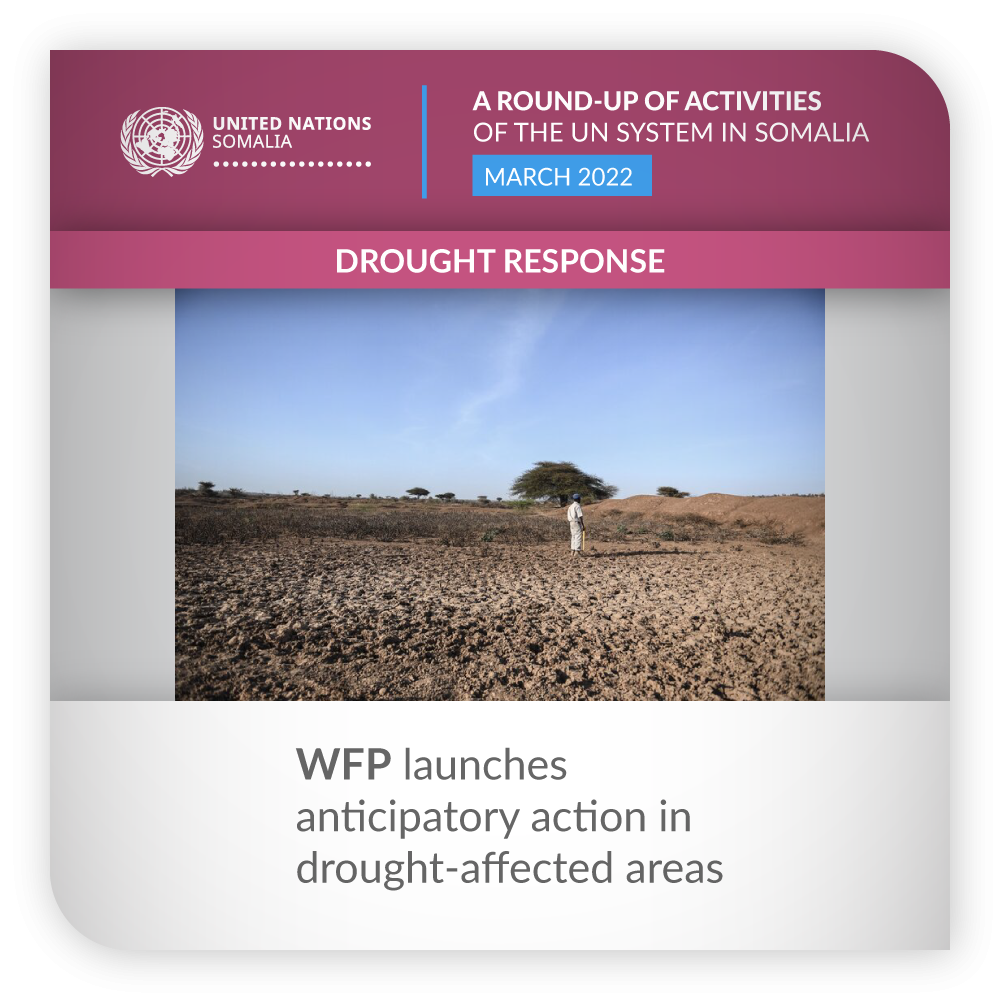 | Drought Response | WFP launches anticipatory action in drought-affected areas WFP launched a new anticipatory action intervention in the Xudur and Waajid districts of the Bakool region, two of the areas in Somalia hardest hit by drought. The anticipatory action comes ahead of a Gu season that, if it fails to deliver adequate rainfall, would mark a fourth consecutive failed rainy season – exposing the people of Waajid and Xudur to an increasingly dire impact from a drought of historic severity. The programme combines cash transfers, targeting 118,000 people through a scale-up of Baxnaano, a national social safety net; and a public information campaign delivered through local radio to more than a million listeners, outlining practical measures to mitigate the impact of drought. The intent is to ensure that the most vulnerable Somalis have the requisite capital and knowledge to protect their lives and livelihoods. | |
 | Drought Response | UNHCR provides livelihood assistance to drought-affected communities UNHCR, working closely with other humanitarian partners, is scaling up its drought response to deliver much-needed livelihood assistance to the most-affected people. UNHCR has engaged in lifesaving activities through the distribution of Emergency Shelter Kits, reaching 1,088 households – equivalent to around 6,500 individuals – and through Cash-based Interventions via banks in Guri’el, in Galmudug. In the coming weeks, UNHCR will distribute cash grants and multipurpose cash to the most vulnerable drought-affected people in south-central Somalia, following an ongoing assessment to identify the most vulnerable beneficiaries. | |
 | Drought Response | FAO provides emergency cash assistance for rural families FAO continued scaling up its cash assistance to thousands of rural families affected by the drought in Somalia. In the Belet Weyne district of Hirshabelle, farmers receiving FAO assistance in the form of emergency cash transfers were able to purchase food, medicine, water and livestock for their families. They also received tools and drought-resistant seeds to aid their economic recovery and take advantage of the next planting season. According to FAO, every $1 spent on rural livelihoods can save up to $10 on food-related assistance later on. The support also mitigates some of the physical and health risks and emotional toll that comes with being displaced. By protecting rural livelihoods, FAO is helping families to stay together and recover faster from the drought. However, FAO notes that greater support is needed to prevent the current crisis from becoming a catastrophe. | |
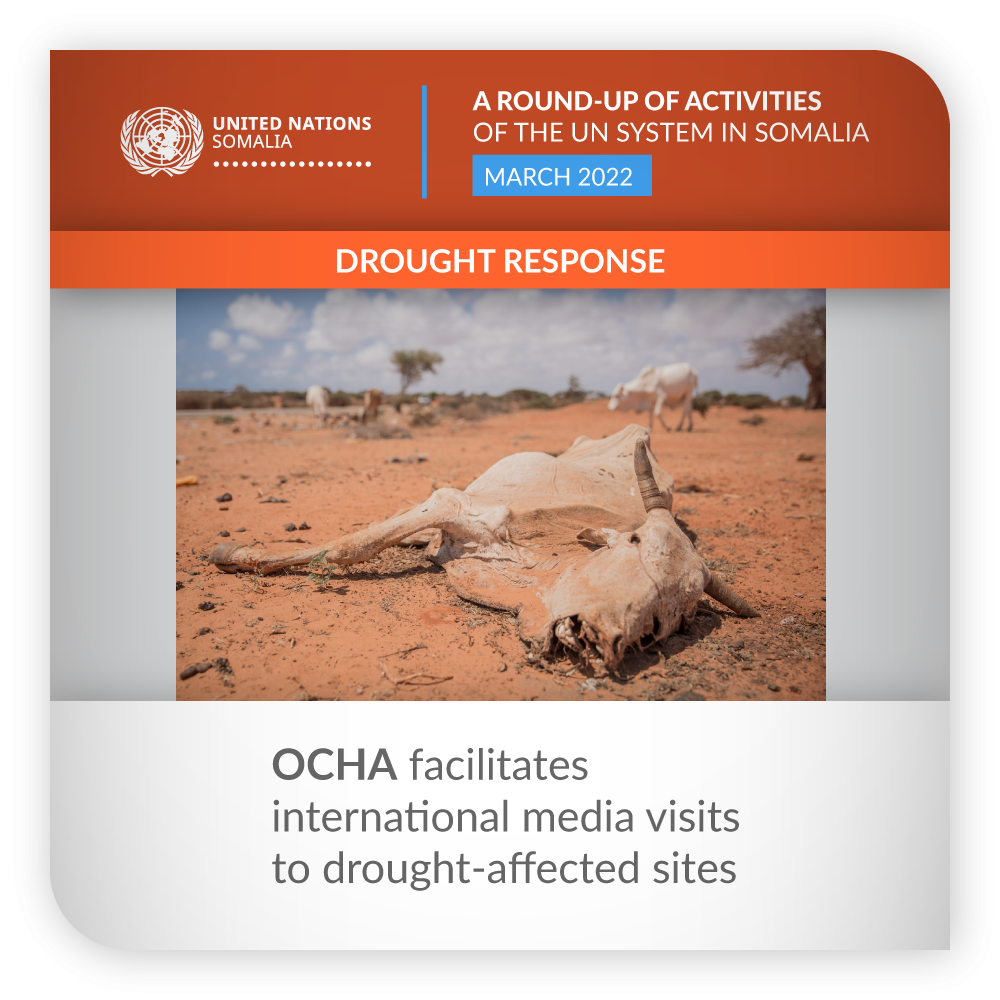 | Drought Response | OCHA facilitates international media visits to drought-affected sites OCHA facilitated international media visits to the Luuq and Galkayo districts in the Gedo and Mudug regions, respectively, to draw international attention to the dire situation being faced by many Somalis. The visits covered the drought emergency and highlighted needs and humanitarian responses in the affected areas. Somalia is facing a drought emergency, with about 4.5 million people affected by the crisis, up from 3.2 in December 2021. Overall, millions of Somalis have been internally displaced and, according to OCHA, with the next rainy season not expected until April, Somalia is facing a potential catastrophe. | |
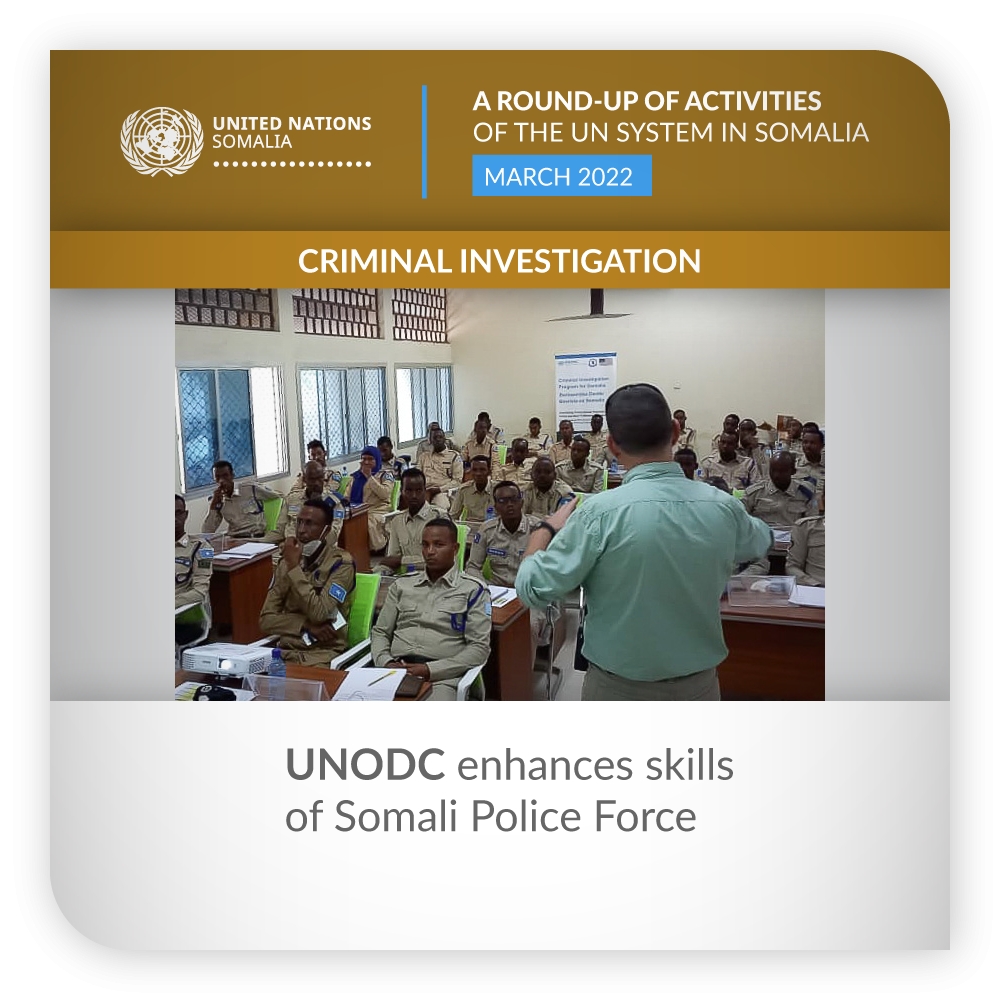 | Criminal Investigation | UNODC enhances skills of Somali Police Force UNODC continued providing support to the Federal Government of Somalia and Federal Member States for enhancing the criminal investigation capacity to combat crime. It did this through the provision of workshops on the UNODC-developed Investigator Development Pathway (IDP) training course for criminal investigators, police officers and prosecutors, which aims to help them to effectively respond to criminal matters, including transnational organized crime. The IDP courses are delivered as part of the UNODC Criminal Investigation Program in Somalia, also known as CIP. In March, a total 69 police officers from the Banadir region graduated from the first course, a ten-day course known as the Investigator Development Course 1 (IDC1). | |
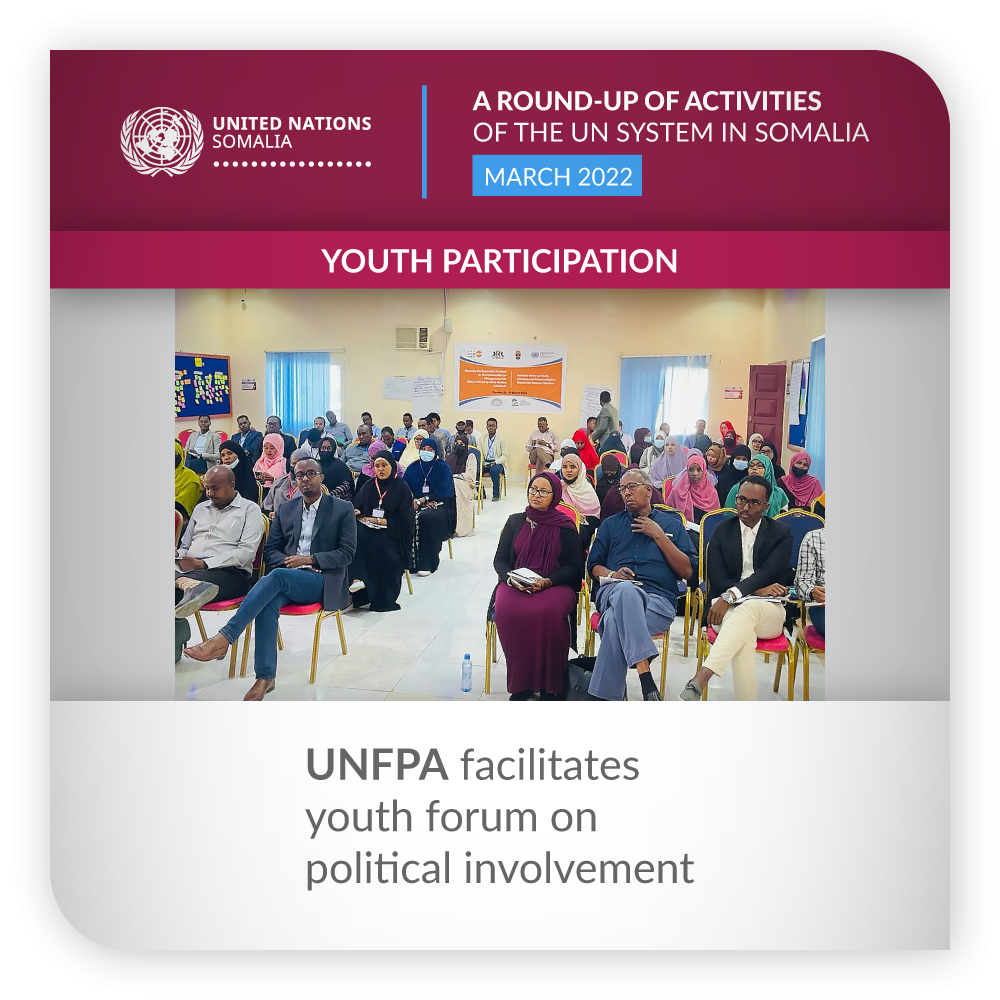 | Youth Participation | UNFPA facilitates youth forum on political involvement UNFPA facilitated a three-day forum on ‘Youth, Elections and Democratization’ in Garowe, in the northern Federal Member State of Puntland. The forum, which was organized in collaboration with the Folke Bernadotte Academy, UNSOM and the Puntland Development and Research Center, was aimed at creating a better understanding and improved way of working to increase youth political participation in Somalia. According to UNFPA, the forum was a critical platform for young people to meaningfully engage in decision-making, voice the challenges faced in their communities, and improve their advocacy, problem-solving, negotiation and communication skills. It also challenged them to build better relationships amongst themselves and to form strong youth leagues that will act as their vehicle for political involvement beyond the current elections. | |
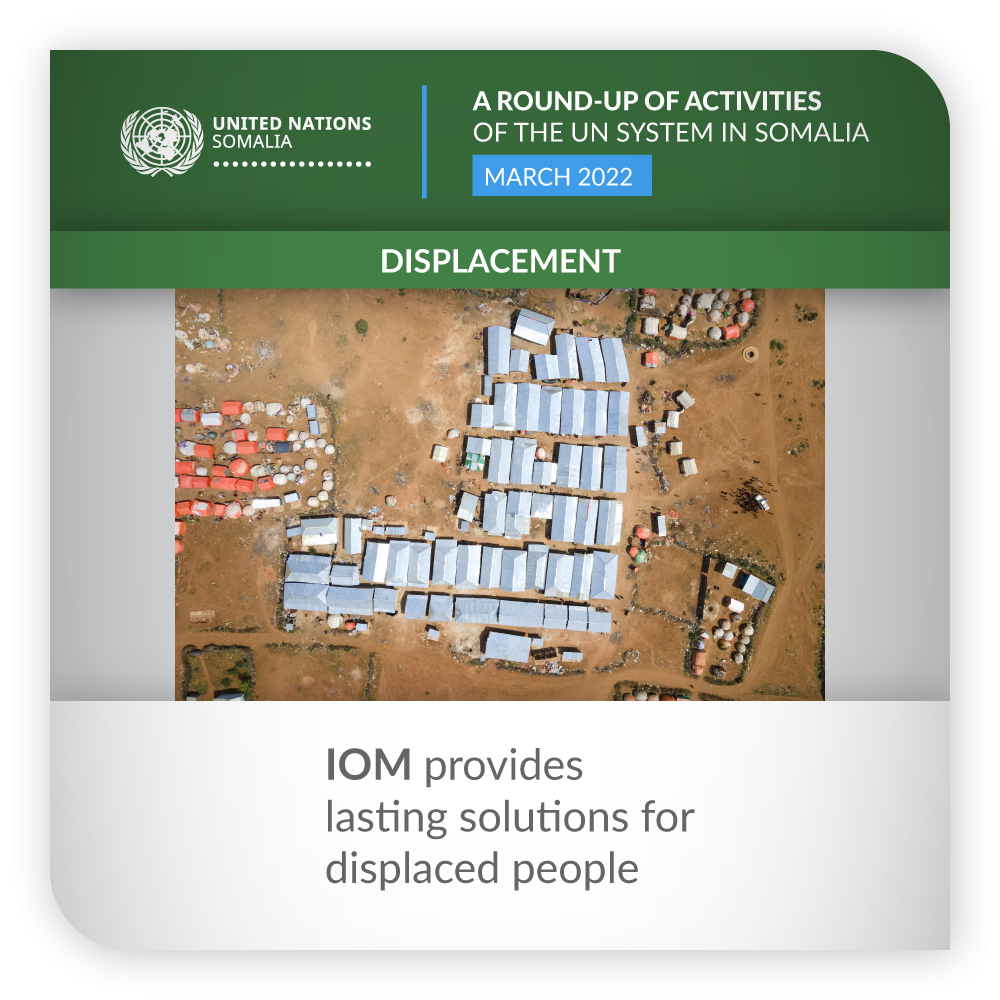 | Displacement | IOM provides lasting solutions for displaced people IOM, along with UN partners and the Federal Government of Somalia, launched a new four-year, multi-million dollar project named ‘Saameynta’ – which means ‘impact’ in Somali – to achieve durable solutions for more than 75,000 internally displaced people (IDPs) and vulnerable host communities in Somalia. The project also seeks to decrease dependency on humanitarian aid, reduce poverty for thousands of impoverished individuals and promote IDPs’ integration in cities. ‘Saameynta’ comes at a crucial time as the displacement situation in the country has been further exacerbated by the drought, the closure of refugee camps in neighbouring countries and the impact of the COVID-19 pandemic. | |
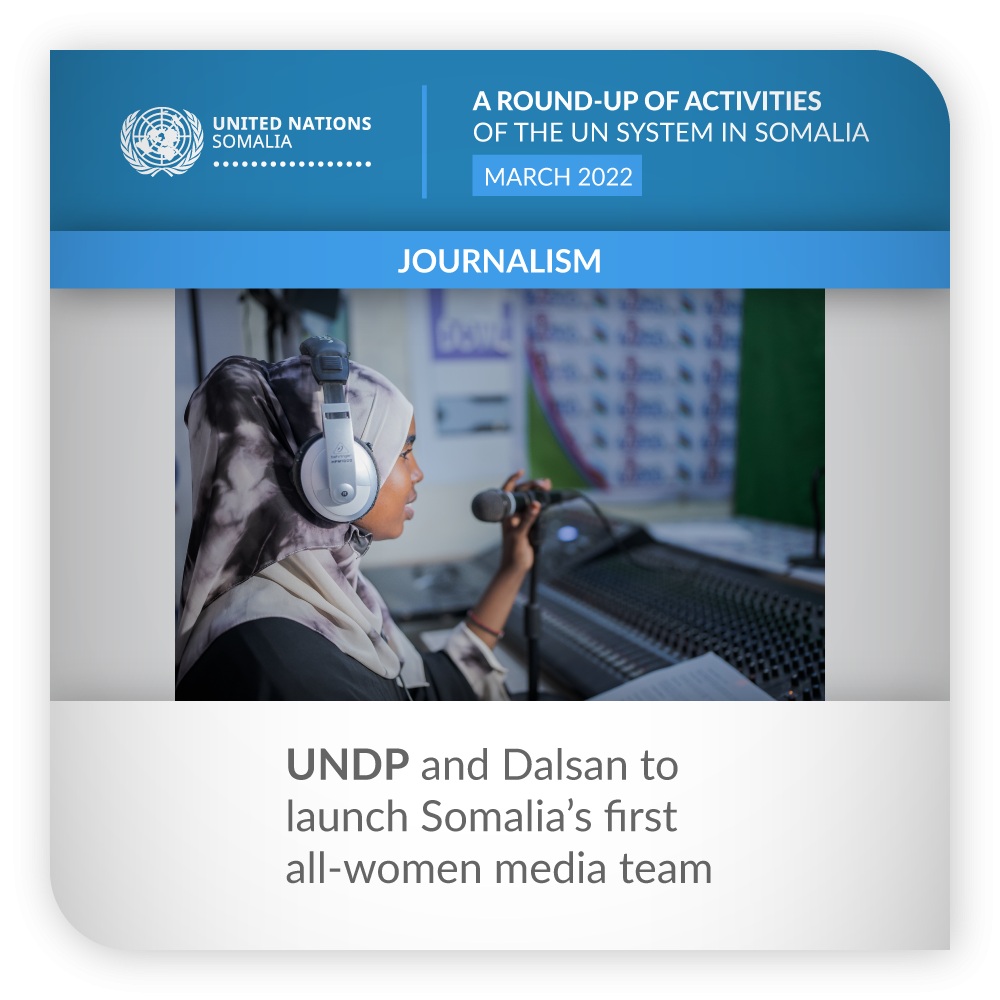 | Journalism | UNDP and Dalsan to launch Somalia’s first all-women media team UNDP and the Dalsan media group have been supporting the creation of ‘Bilan,’ Somalia’s first all-women media unit, with the its formal launch due in April. ‘Bilan’ will provide women with a safe space to work and the power to choose what they report and how they report it, with the team covering a mix of hard news and in-depth features, and with a focus on issues of importance to women. With its unique perspective and access to women’s lives and opinions, ‘Bilan’ aims to break new ground not just for women journalists but also for Somali journalism, shining a light on stories – from domestic violence to pay inequality – that have long been ignored. While supported by UNDP and hosted by Dalsan at its Mogadishu offices, the team is fully independent, with complete editorial control and the women journalists deciding what stories to cover and when and how they will cover them. | |
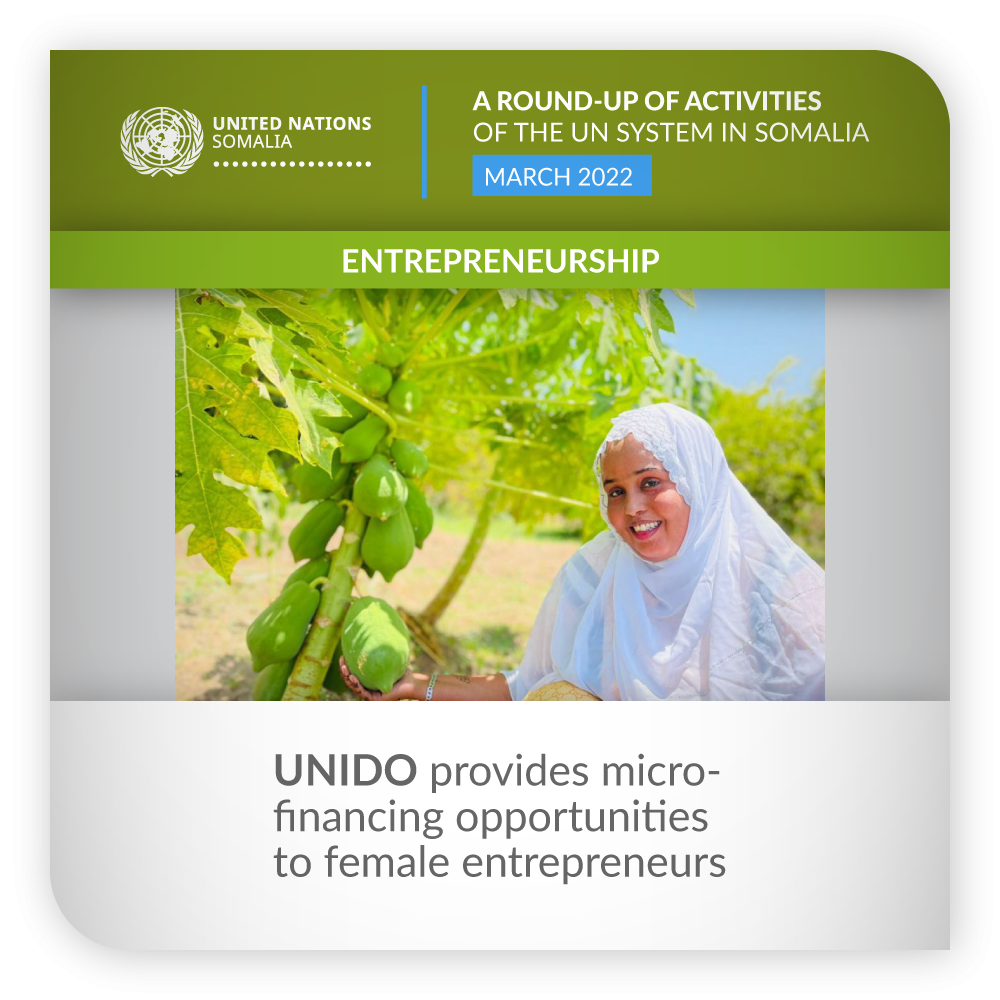 | Entrepreneurship | UNIDO provides micro-financing opportunities for female entrepreneurs UNIDO continued its support for Somali women entrepreneurs to help them escape the cycle of poverty by providing an opportunity to gain access to finance, earn a sustainable livelihood and contribute to the job creation process, through an innovative approach of investing in the productive sector. Through an agro-technology development project, funded by the Italian Agency for Development Cooperation, UNIDO’s efforts included a micro-credit facility in Kismayo, in the southern Federal Member State of Jubaland, which has so far benefitted 38 women. The women received $1,000 to purchase farming tools and crop seeds to boost the productivity of their farms, generate income, and support their families. | |
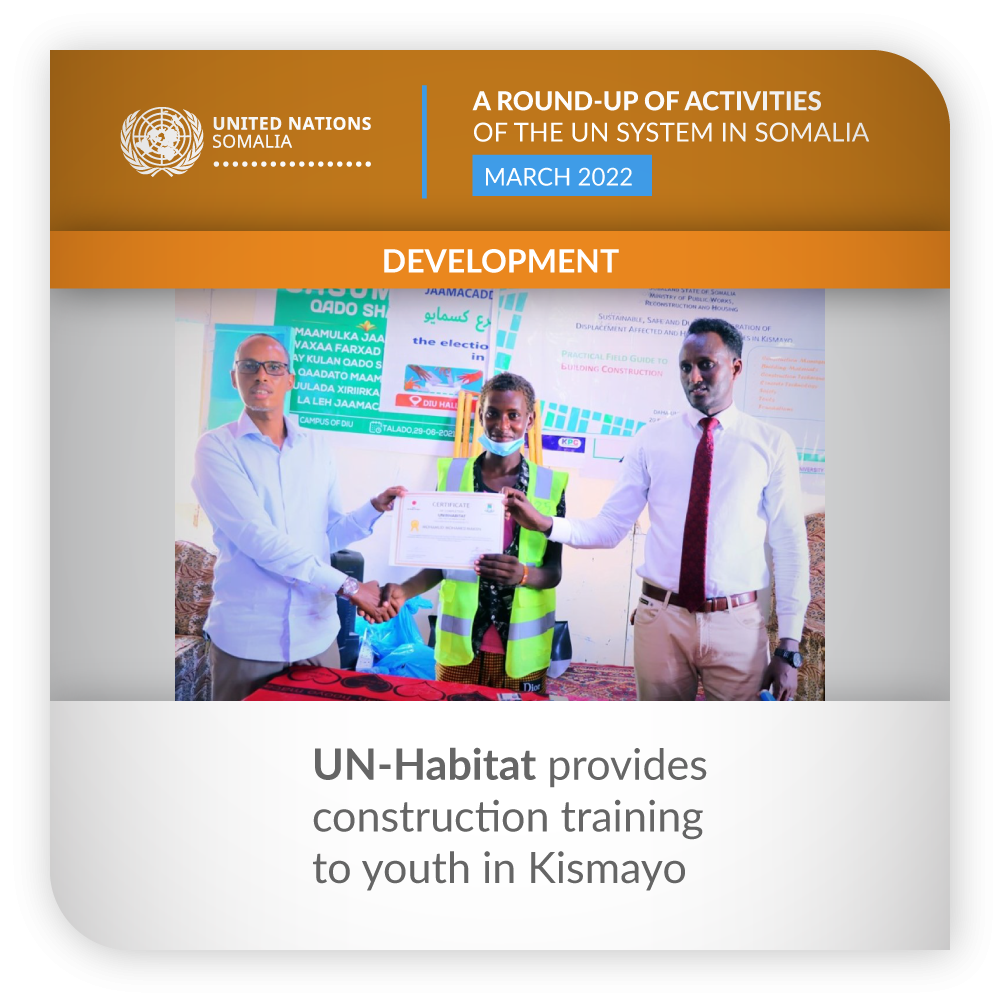 | Development | UN-HABITAT provides construction training to youth in Kismayo UN-Habitat offered a month-long construction skills training to 50 youth, male and female, in Kismayo, in the southern Federal Member State of Jubaland, to equip them for job opportunities in the industry. The trainees were drawn from internally displaced people and refugee returnees, drought-affected communities and vulnerable communities from five villages in the Kismayo area. The course curriculum included both theoretical and practical classes in areas such as steel fixing, carpentry, masonry and cement mixing, among others. Japan provided funding for the training. In addition to receiving certificates attesting to their qualifications, the trainees also received a starter construction toolkit to ensure they stand a better chance in job opportunities or self-employment. | |
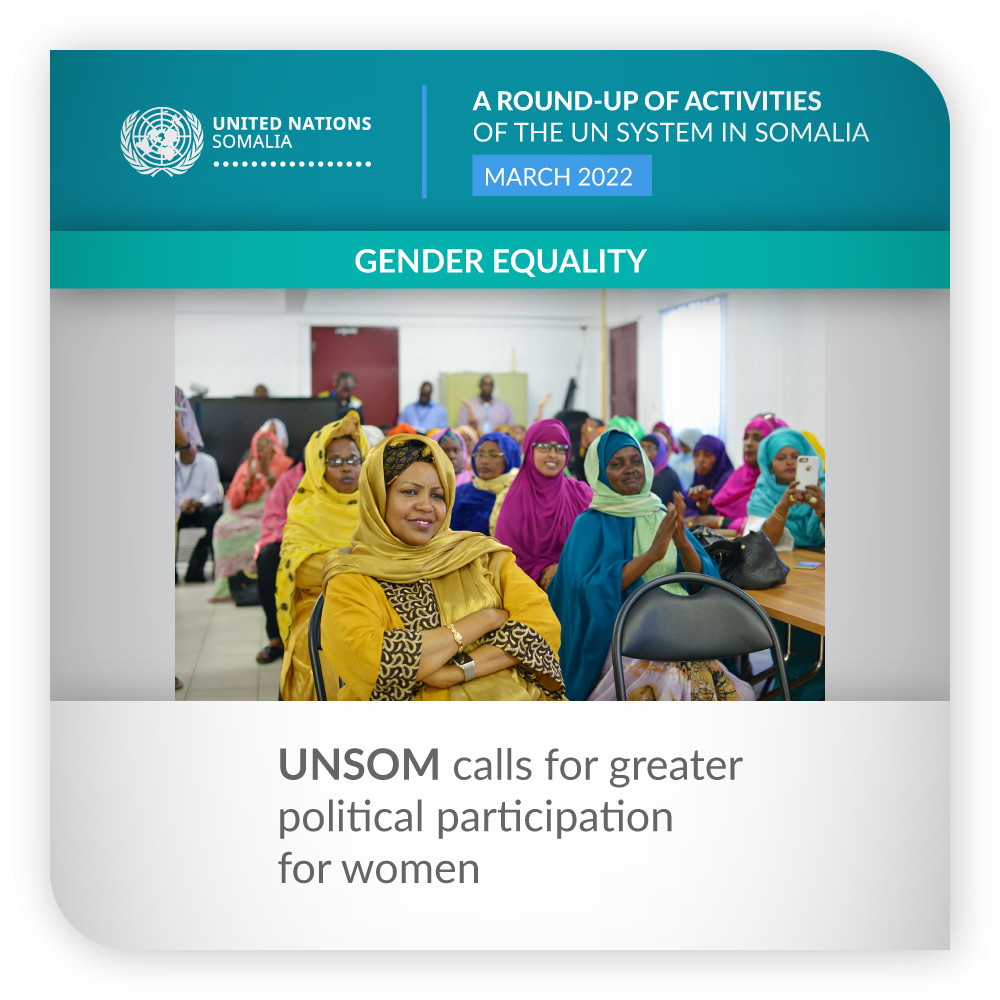 | Gender Equality | UNSOM calls for greater political participation for women Marking International Women’s Day, the UN Secretary-General’s Special Representative for Somalia, James Swan, congratulated Somali women for their tireless efforts and immense contributions to promoting peace, political stability and development in the country. Mr. Swan also said that, as Somalia prepares for a new government, there was an opportunity to advance gender equality and women’s political empowerment and leadership for sustainable peace and development. International Women’s Day has been observed around the world since 1975, to celebrate the social, economic, cultural and political achievements of women. The day marks a call to action for accelerating gender equality. |
A round-up of activities of the UN system in Somalia in March 2022
- 01 April 2022
- Newsletters and Round-ups of UN Activities
- Top Stories






